
Fifty-seven years ago, America was in the throes of its love affair with Arthur Godfrey. Tiger at his most influential couldn’t hold a candle to “the ol’ redhead.”
Sponsors of all shapes and sizes were pounding on CBS doors trying to get a piece of the action. If anyone doubted that Godfrey was the undisputed king of radio and television, a brace of magazines and newspaper columnists would beg to differ. TV Guide labeled him, “Boyish, open-faced, apple-pie likable… television’s Huck Finn.” Attempting to pinpoint Godfrey’s unprecedented appeal, Ben Gross of the New York Daily News, wrote: “It is his friendliness, his good cheer, his small-boy mischievousness and his kindly philosophy… or maybe it’s his magnetism, his personal attractiveness.

Whatever it was, by 1953, Godfrey accounted for 12% of CBS’ annual television revenues, according to Robert Metz’s book, Reflections in a Bloodshot Eye. He had two prime-time series: “Arthur Godfrey’s Talent Scouts” on Monday evenings (the lead-in to “I Love Lucy”) and on Wednesday, “Arthur Godfrey and His Friends,” an hour-long variety series… although “variety” might be too strong a word.
Try to imagine tuning in weekly to see the same collection of singers and vocal groups – no vaudeville acts or celebrity guest stars, if you please; just Arthur and his “Little Godfreys” – alternately render a tune in between the host’s folksy banter and playful commercial spiels. Now imagine that this show is a top ten entry from 1951-54, while “Talent Scouts” – the “American Idol” of its day – is a top three show (#1 during 1951-52) during the same stretch.
At one point early on, CBS gave Godfrey 15
 minutes of prime time twice weekly to give ukulele lessons!
minutes of prime time twice weekly to give ukulele lessons!Then there was “Arthur Godfrey Time,” the 90-minute CBS weekday morning radio show simulcast on the TV network beginning in 1952. The show was only televised Monday through Thursday – on Friday, Godfrey hosted via remote from his Leesburg Virginia farm, which precluded any TV cameras. The show contained six 15-minute segments, each with a different sponsor, although Lipton Tea and Chesterfield cigarettes were mainstays (the latter until Godfrey went under the knife for lung cancer in 1959).

Reportedly he refused to accept any sponsor whose product he didn’t personally endorse from his own experience… which ensured stockpiles of various freebees would make their way to Leesburg.
But the bigger they are, the harder they fall… and it was the final segment of “Arthur Godfrey Time” on Monday, October 19, 1953, that concluded with Godfrey’s metaphoric golf club to the head. This was, of course, the broadcast in which he fired singer Julius La Rosa on the air. Although “fired” might be too strong a word as well.
La Rosa was a Brooklyn native who, while serving a stint in the Navy, auditioned for
Godfrey on October 4, 1950. Impressed with the young sailor’s vocal gifts, Godfrey twice had him appear on “Talent Scouts” when on shore leave, and promised him a steady job upon his discharge. The young man happily took him up on this generous offer (see related article), and on November 17, 1951, Julius La Rosa became one of “the Little Godfreys,” with steady appearances on “Arthur Godfrey Time” and “Arthur Godfrey and His Friends.” With Godfrey’s orchestra leader, Archie Bleyer, La Rosa co-formed Cadence Records and recorded a string of hits. By mid-1953, the 23-year-old crooner’s fan mail was outdistancing that of his boss.
That, however, may not have been the issue. According to La Rosa, he was forced to miss a ballet class (a Godfrey mandate to his entire on-air staff) due to a family crisis. The next day, he found a memo tacked to the staff bulletin board: “Since you felt your services weren’t required at the ballet lesson yesterday, you won’t be needed this morning on the show.” La Rosa tried to reach his boss at his hotel; he tried phoning… no luck. “I’m sure I’m in trouble,” concluded La Rosa, according to Max Wilk’s 1976 book, The Golden Age of Television: Notes From the Survivors. “What do you do when you’re in trouble in show business? You figure you need some muscle of your own, right? And you hire yourself an agent.”
With that move, La Rosa broke the unwritten commandment for Little Godfreys: Thou Shalt Not Acquire Outside Representation. And La Rosa picked a winner: Thom Rockwell, president of General Artists’ Corporation and personal agent for Perry Como. Said Godfrey at the time, “I had told (La Rosa) a long time ago one thing I wouldn’t stand for was outside interference by personal agents.”
Before
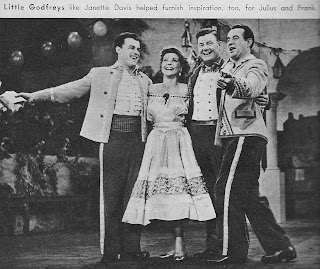 the ink had dried on La Rosa’s contract, Rockwell dashed off a letter to Godfrey and CBS informing them that he would henceforth be handling the singer’s affairs.
the ink had dried on La Rosa’s contract, Rockwell dashed off a letter to Godfrey and CBS informing them that he would henceforth be handling the singer’s affairs.La Rosa knew what was coming: “Now it was just a question of when. Rockwell’s letter was mailed, (Godfrey) got it maybe by the end of the week.” At which point, he went to Frank Stanton, president of CBS, seeking advice. Stanton’s suggestion: You hired him on the air, you can fire him the same way.
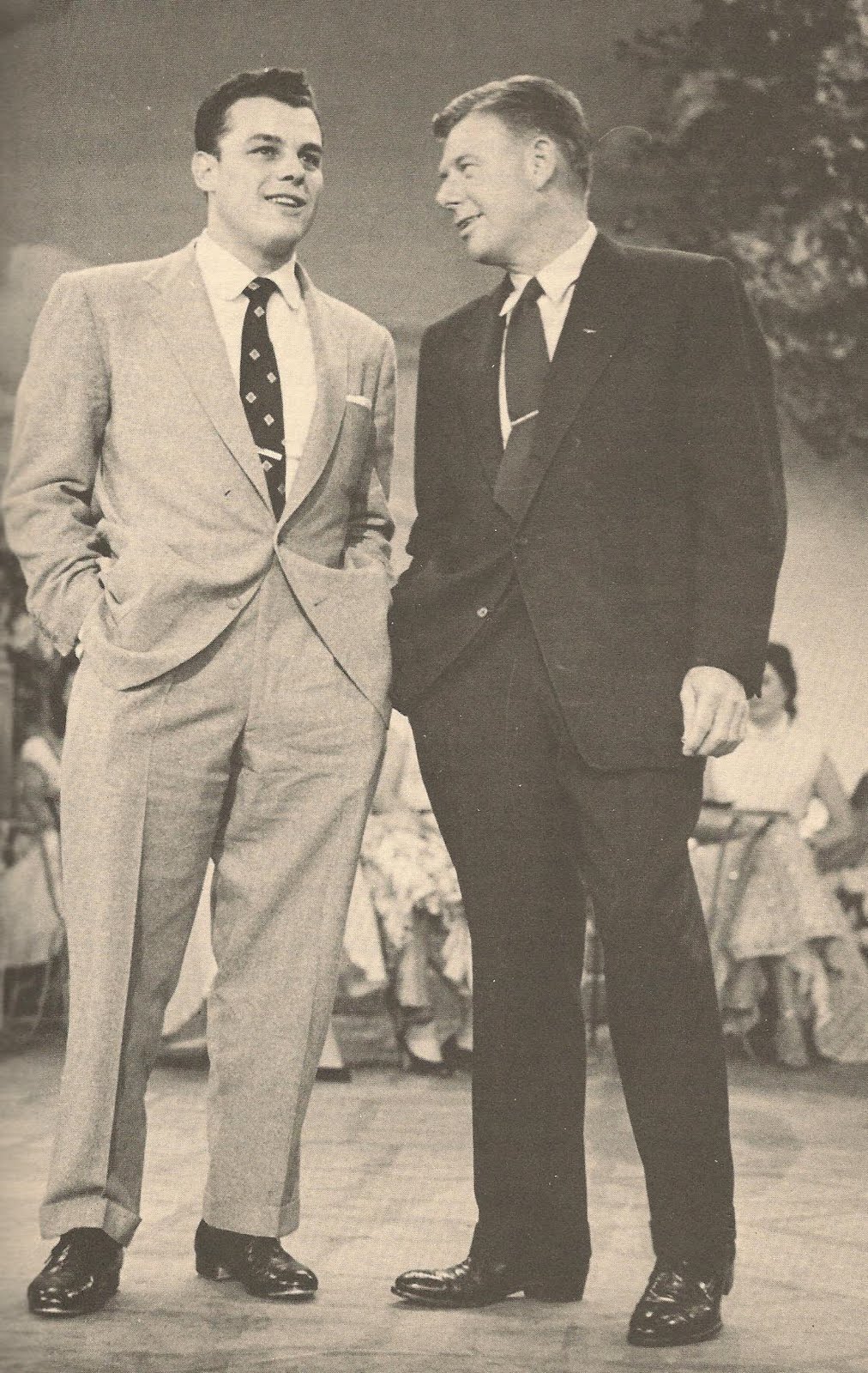
Flash forward to the following Monday, October 19. La Rosa: “I get to work at the radio studio (for “Arthur Godfrey Time”). I was scheduled for the 10:15 segment, but one of the ways Godfrey would discipline you would be to keep you sitting around there, waiting to go on. It was his show – he pulled all the strings.
All morning I sit there waiting, I’ve got two different songs to do.”
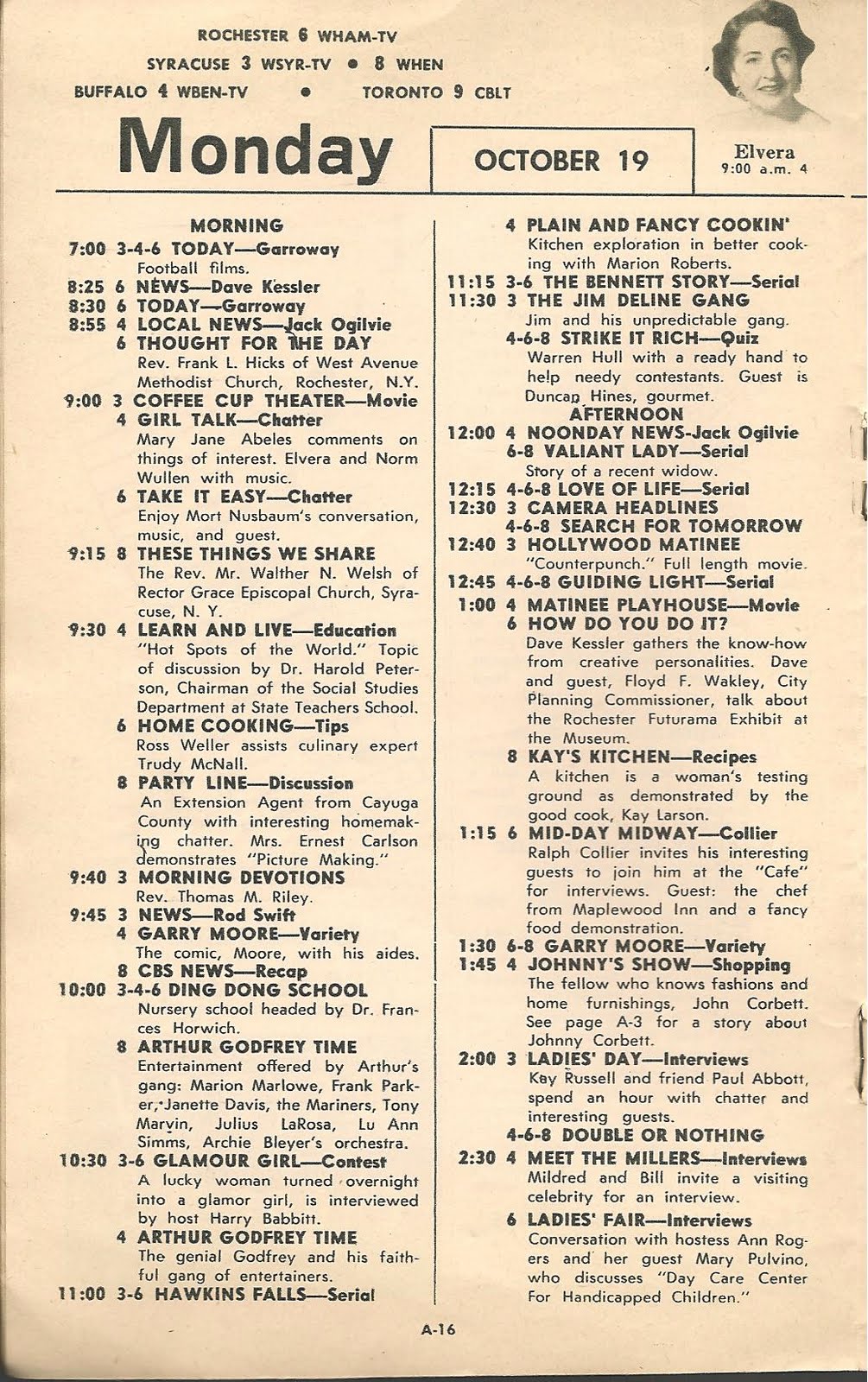
With the clock closing in on 11:25, Godfrey finally told the studio audience, “I want you to meet a young man named Julius La Rosa.”
Most sources declare that the telecast had ended by this point; that only the radio audience heard what was to follow. It appears, though, that while some CBS-TV affiliates only covered part of the day’s proceedings, others signed on for the full 90 minutes and would have carried the finale. As an example, according to this TV Guide page for that date, Buffalo’s channel 4 televised only the second half-hour, but Syracuse’s channel 8 aired the entire program.
In any event, audio of the final five minutes survives and is in circulation. Some written accounts have Godfrey commenting on La Rosa’s rise to fame and snidely asking him, “This show must be a pain in the neck to you, huh?” or something similar, but the existing recording contains nothing of the sort.
Rather, Godfrey assures the audience that their enthusiastic reception “pleases me mightily.” Arthur asks Julius, “How long ago did you come (to us)?”
Julius: “November 17, 1951… it’ll be two years next month.”
Arthur: “Not quite two years… so it was about three years ago when I first met you.”#8221;

Julius: “October 4th, 1950.”
The audience laughs at Julius’ precise recollection, but his voice sounds tentative… like he’s bracing himself for what might follow. Godfrey continues, addressing the audience:
Arthur: “When I first met Julie… I’ll never forget, when he first came up here, and I said to him, ‘When you get out of that man’s Navy, if you don’t want to stay in for thirty years, just come on up here, and I’ll give you a job,’ and he took me at my word. And he came and I put him to work, and immediately everybody loved him. And it has always done my heart good to see that you people saw the same quality in him that I saw. Which, if you have noticed, and I’m sure you have, is the same quality that I have in everybody in my cast. I picked ‘em all that way. Sure, he’s got a good voice, but lots of people have good voices. There’s something else that you like, which is a wonderful quality that is hard to get.
“And I would like Julius, if he would, to sing me that song called ‘Manhattan.’ Have you got that? Huh?”
Julius: “Yes, sir.”
Arthur: “Sing me that.”
Bleyer’s band struck up the tune and La Rosa sang. Applause… then it happened:
Arthur: “Thanks ever so much, Julie. That was Julie’s swan song with us. He goes now out on his own, as his own star, soon to be seen in his own programs. And I know you wish him Godspeed, same as I do.”
Later in the week, Godfrey told Edward R. Murrow, on the latter’s “Person-to-Person,” that he didn’t have enough time left for a full send-off.
Based on Godfrey’s build up of La Rosa’s star power during the broadcast, initial news reports assumed that the singer had requested his release, which was graciously granted. But Rockwell saw the chance for the kind of publicity money couldn’t buy. The next day, La Rosa told the press he was “a very confused guy,” not comprehending his dismissal at all, while Rockwell bragged, “Anyone who can make four thousand bucks for a one-night stand needs an agent. The kid is hot, there’s no question about it.”

Kid indeed. Twenty-three years later, La Rosa understood just how green he was: “Talk about twisted values. I was completely unprepared for what happened – the enormous impact the whole thing had.” Not two days after what was now reported as a public firing, Ed Sullivan – ever the opportunist – signed La Rosa for thirteen appearances on his “Toast of the Town.” “Again, I wasn’t prepared,” said La Rosa. “I felt like saying, ‘No, not thirteen times a year for all that money – please, let me go up to the mountains, let me do shows, clubs; let me learn what I’m doing first – order me back then.’” Not a chance;
Behind the scenes, Godfrey also released Archie Bleyer, ostensibly for paying more attention to his record company to the detriment of Godfrey’s programs, but primarily because Bleyer had used part of a two-week paid vacation to record Don McNeill, Godfrey’s long-time rival from ABC. In fact, this axe fell just hours after the “swan song” broadcast. “It really hurt,” Godfrey told the press. “I said, ‘Arch, I just fired Julie and it was like tearing my eyeballs out, and I guess you’re next.” With this news, the press went berserk; you can sample just a portion of their output here.
With La Rosa’s “confused guy” coupled with Rockwell’s bluster, Godfrey’s temperature rose, and he felt compelled to make a public statement… which would become his metaphoric cell phone text to the mistress. “Whenever I take anybody on my shows, it’s because I go a little crazy about a quality I see in them which, for lack of a better word, I call ‘humility.’ I don’t have any real artists on my show…. I’ve felt that, rather than a good voice, a likable, lovable personality is more important.” Godfrey then explained that, with the hiring of an outside agent, it was clear to him that La Rosa had lost this quality.
Meanwhile the public, after having gorged on all this coverage, eventually decided that if Arthur Godfrey was concerned about lost humility, perhaps he should start searching for his own. From this point on, the decline began. Both his night-time shows fell from the top ten – and “Godfrey and His Friends” dropped out of the top twenty – during the 1953-54 season, never to return.
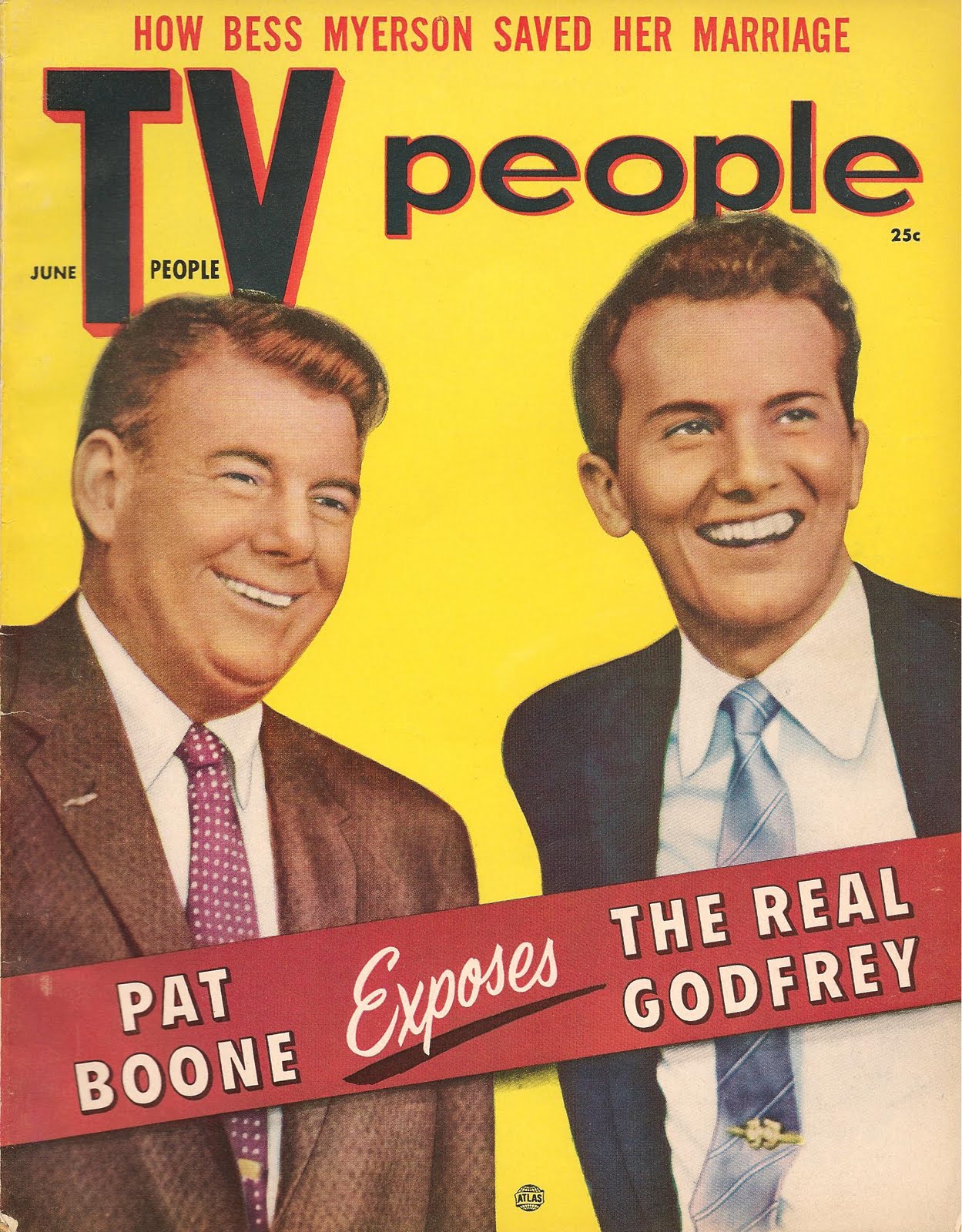
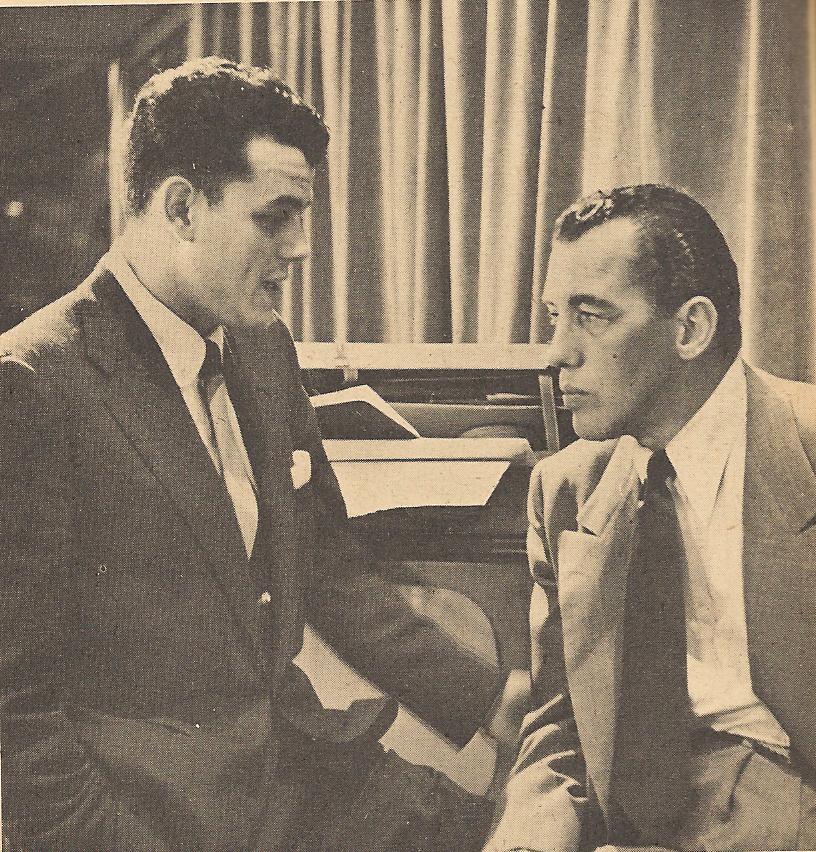
In April 1955, Godfrey went on another purge, firing several long-time “Little Godfreys” like Marion Marlowe, Lu Ann Simms, Haleloke and Bleyer’s successor, Jerry
 Bresler. For his troubles he received another round of bad press. Although other “Friends” would come along – notably Pat Boone and Carmel Quinn – they could not restore the show or its host to their former glory.
Bresler. For his troubles he received another round of bad press. Although other “Friends” would come along – notably Pat Boone and Carmel Quinn – they could not restore the show or its host to their former glory.“Arthur Godfrey and His Friends” left the air in the summer of 1957, and “Talent Scouts” a year later. At least a portion of “Arthur Godfrey Time” would be telecast until April 1959, while the radio show continued until 1972. Godfrey weaved in and out of
 TV during the 1960’s, hosting specials and variety shows like “Hollywood Palace.” His successful battle against lung cancer awarded him some long-lost respect, but he would never again command the power of the old days.
TV during the 1960’s, hosting specials and variety shows like “Hollywood Palace.” His successful battle against lung cancer awarded him some long-lost respect, but he would never again command the power of the old days.Godfrey died in 1983, having long since been consigned to nostalgia retrospectives, trivia questions, and word-association games (the word being “humility”). Today, we look at the few kinescopes and listen to surviving broadcasts, and wonder what our grandparents were thinking, paying this guy so much attention and buying whatever he told them to. Armed with the La Rosa incident – and “Julie” remains to tell his side of the tale – and a few other latter-day recollections, posterity labels Arthur Godfrey an opinionated, hard-nosed, conceited S.O.B. of limited talent, who fooled the great unwashed with a generous helping of folksy charm, hopelessly outdated in these modern times. That may not be wholly true, but it’s the perception that sticks.
Perhaps Tiger Woods should take note: no matter how great you think you are, the public is notoriously fickle when it comes to celebrities. The issue isn’t that they can’t or won’t forgive your foibles. The issue is that they can’t forgive themselves for being taken in by a carefully crafted image… and they’ll take that out on you.
 Arthur would know.
Arthur would know.